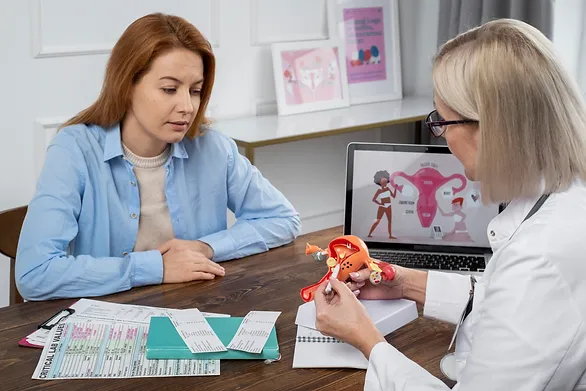Fertility and Endometriosis: A Woman’s Guide to Understanding and Coping
1 in 10 women (10%) of reproductive age women and girls are affected by endometriosis worldwide. With endometriosis, the tissue that normally lines the lining of your uterus grows outside of it, resulting in swelling, discomfort, and occasionally scars. Additionally, it may potentially affect your fertility.

Understanding Endometriosis
First things first, what exactly is endometriosis? Imagine the lining of your uterus, where babies grow, starts growing outside where it’s supposed to be. This can cause pain, especially during your period, and can affect other parts of your body too. It’s like having a garden where the plants start growing outside the garden bed – not where they’re supposed to be!
Understanding Your Body
Knowing your body well can make a big difference. Tracking your menstrual cycle, understanding your symptoms, and noticing any changes can help you manage endometriosis better. It’s like being a detective in your own body – the more you know, the better you can take care of yourself.
The Importance of Early Detection
One of the keys to managing fertility and endometriosis effectively is early detection. Being aware of the symptoms and getting diagnosed early can make a significant difference. Symptoms like painful periods, heavy menstrual bleeding, or pain during intercourse should be discussed with a doctor. Early detection can lead to earlier treatment, which can help in preserving fertility.
Understanding the Stages of Endometriosis
Endometriosis can vary in severity, typically described in stages from minimal to severe. Understanding what stage your endometriosis is at can help in making informed decisions about treatment and fertility planning. It’s a bit like knowing the terrain before making a journey – it prepares you for what might be needed ahead.
The Role of Genetics
Recent studies have suggested that genetics might play a role in endometriosis. This means if someone in your family has it, you might be more likely to develop it too. While this might sound worrying, it’s helpful to know as it can guide you towards early screening and intervention.

Endometriosis and Fertility
Now, you might be wondering, “How does this affect having babies?” Well, when things aren’t growing where they should be, it can make it tricky for everything to work right. Endometriosis can make it harder to get pregnant, but here’s the good news – many women with endometriosis still have babies!
Fertility Options
For those of us dreaming of having a baby, endometriosis can make it a bit more challenging, but there are options. Some moms go the natural route, while others might need a little help from treatments like IVF (in vitro fertilization). It’s all about finding the path that’s right for you.
Fertility Planning
If you’re thinking about having a baby, it’s a good idea to start planning early. This might mean talking to your doctor about fertility preservation options like freezing eggs. It’s all about giving yourself the best chance when you’re ready to start a family.
Fertility Counseling
Fertility counseling can be a valuable resource for women with endometriosis. It can provide emotional support, offer guidance on fertility options, and help in making decisions about treatments. Think of a fertility counselor like a navigator who helps you chart the course in your fertility journey.
Fertility Preservation
For women diagnosed with endometriosis at a younger age, fertility preservation can be an option. This might involve freezing eggs or embryos for future use. It’s like saving a piece of today for tomorrow. It’s a personal decision, but one that can open doors for family planning later on.
Fertility and Endometriosis in Different Life Stages
Endometriosis can affect women differently at different ages. For younger women, it might be about managing symptoms and preserving fertility for the future. For those in their 30s and 40s, it might be more about actively trying to conceive and considering fertility treatments if necessary. Understanding how endometriosis impacts fertility at different life stages can guide your decisions and expectations.
Pregnancy and Endometriosis
Pregnancy can have a surprising effect on endometriosis. Some women find that their symptoms improve during pregnancy. It’s like the body takes a little break from the usual endometriosis issues. However, it’s important to discuss this with your doctor, as everyone’s experience can be different.
After Pregnancy
Post-pregnancy, endometriosis symptoms might come back, or they might change. It’s a time to keep a close eye on your health and stay in touch with your healthcare provider. Remember, taking care of yourself is just as important after you have your baby.
Endometriosis Treatment
Diagnosis and Treatment
Getting diagnosed with endometriosis can be a journey. It often starts with a visit to your doctor, talking about your symptoms, and maybe even having some tests done. The treatment can be different for everyone – some might need medicine, others might need surgery, and some just need regular check-ups. It’s all about what works best for you and your body.
The Role of Healthcare Providers
When it comes to managing fertility and endometriosis, healthcare providers play a key role. They’re like our guides on this journey. Your doctor can help you understand your condition, discuss treatment options, and support you through fertility treatments if needed. It’s important to build a good relationship with your healthcare provider – don’t hesitate to ask questions and share your concerns.
Holistic Approaches
Apart from medical treatments, many women find relief in holistic approaches. This can include acupuncture, yoga, or meditation. These methods can help manage pain and stress related to endometriosis. Think of them as additional tools in your toolbox – they might not be the solution for everyone, but they can be helpful alongside medical treatments.
The Role of Alternative Medicine
Some women explore alternative medicine for managing endometriosis and improving fertility. This can include herbal remedies, homeopathy, or naturopathy. While these methods are not a substitute for conventional medical treatment, they can be complementary. It’s important to discuss these options with your healthcare provider to ensure they’re safe and potentially beneficial.
The Role of Laparoscopy
Laparoscopy is a common surgical procedure used both for diagnosing and treating endometriosis. It involves a small camera to look inside the pelvis and can also be used to remove endometrial tissue. This minimally invasive surgery can sometimes improve fertility by removing tissue that might be interfering with the reproductive organs.
The Impact of Surgery
In some cases, surgery might be recommended for endometriosis, especially if it’s affecting fertility. This can range from minor procedures to more extensive ones. Surgery can remove endometrial tissue, which might help in improving fertility. It’s like clearing out the weeds in a garden to help the flowers grow better. But remember, it’s important to discuss the risks and benefits with your doctor.
Endometriosis Management
Menstrual Cycle Management
Managing your menstrual cycle can play a big role in dealing with endometriosis. Hormonal treatments like birth control pills can sometimes help manage symptoms by regulating or even stopping your periods. It’s like putting your menstrual cycle on a more predictable path, which can sometimes ease the symptoms of endometriosis.
Pain Management Techniques
Dealing with endometriosis often means managing pain. Apart from medications, techniques like heat therapy, regular exercise, and physical therapy can help. It’s about finding what combination of techniques work best for you to make your days more comfortable.
Optimizing Diet and Lifestyle for Endometriosis Management
Managing endometriosis isn’t just about medical treatments; it’s also significantly influenced by our diet and lifestyle choices. While there’s no one-size-fits-all diet specifically for endometriosis, making mindful changes in what we eat can be beneficial. Including foods rich in omega-3 fatty acids, like fish and flaxseeds, is often recommended. These nutrients are like little helpers that can reduce inflammation and potentially ease some symptoms of endometriosis.
On the flip side, it might be helpful to reduce the intake of certain foods. For example, cutting down on red meat and caffeine could alleviate some symptoms for some women. It’s about listening to your body and noticing how different foods affect you. Every woman’s experience with endometriosis is unique, so discovering what dietary changes work for you is key.
Beyond diet, embracing a healthy lifestyle plays a crucial role. Regular exercise, even gentle activities like walking or yoga, can improve physical and mental well-being. Exercise isn’t just about staying fit; it can also help manage pain and reduce stress, which are common issues for those with endometriosis. Speaking of stress, finding effective ways to manage it – whether through meditation, hobbies, or relaxation techniques – is equally important. Stress can impact our bodies in many ways, so keeping it in check is vital.
In essence, treating your body kindly through a balanced diet and a healthy lifestyle can be a powerful tool in managing endometriosis. It’s about creating an environment where your body can thrive despite the challenges of this condition. Remember, small changes can lead to significant impacts, so start with what feels manageable and build from there.
Long-Term Management
Endometriosis is typically a long-term condition, which means ongoing management is key. Regular check-ups, staying informed about new treatments, and maintaining a healthy lifestyle are all part of this journey. It’s about taking it one step at a time and adjusting your management plan as your life and needs change.
Final Thoughts on Fertility and Endometriosis
Partner Support
Having a supportive partner can make a huge difference in managing fertility and endometriosis. It’s important for partners to be involved, understand the condition, and be part of the decision-making process. It’s not just a ‘women’s issue’ – it’s something that couples can navigate together.
Impact on Sexual Health
Endometriosis can sometimes impact sexual health, causing pain or discomfort during intercourse. It’s important to address these issues openly with your healthcare provider. There are ways to manage these symptoms, ensuring that your sexual health and relationships are maintained.
Research and Advances
The world of medicine is always advancing, and that includes the treatment of endometriosis and fertility issues. New treatments, better pain management techniques, and improved fertility methods are constantly being developed. Keeping up with the latest research can give you hope and more options for your journey.
Raising Awareness
Lastly, raising awareness about endometriosis is crucial. By sharing our stories, educating others, and advocating for better care, we can help improve understanding and support for women with this condition. Every voice matters in the fight against endometriosis and in improving fertility outcomes for women affected by it.
For women facing the intertwined challenges of fertility and endometriosis, the journey is often complex and filled with a mix of hope and uncertainty. It’s a path marked not just by the physical struggles with a condition that can be both painful and perplexing, but also by the emotional resilience required to navigate its uncertainties. This journey, while unique for each individual, is a testament to the strength and determination inherent in the pursuit of motherhood.



